SIGNS THAT YOU HAVE ANGER ISSUES
Anger is a way to express strong and aggressive emotions, which can begin with frustration, disappointment, or resentment. In some cases, anger is good for your health, because anger helps reduce irritation and calm your emotions.
Anger is a normal feeling, but it can have a bad effect if you don’t express your anger properly, or handle anger problems. Emotions from anger are not good or bad, however, it can cause problems by the way you handle and express them. But what are the signs that you have anger issues?
Someone who has difficulty controlling their anger can cause misunderstanding and trigger confrontational behavior. People with anger management problems have a harder time being aware of their expressions or how they affect others.
Signs That You Have Anger Issues –
10 Ways To Control It
What is anger? What does it mean by anger issues?
Anyone can have difficulty controlling anger from time to time. The causes vary, from matters related to work, environmental conditions to those that originate from personal life.
Anger is a big problem for some people. Don’t you agree?
Anger is a feeling that can occur when you feel frustrated, hurt, upset, or disappointed because of something or someone.
The way you deal with anger can help, or vice versa can also hurt you. If we have the right way to recognize and express anger, this condition can help deal with emergencies, maintain good relationships, or even solve problems. But if left unchecked, anger can make you struck with various diseases.
Anger issues are the issues you may experience when you cannot express your anger the right way and when your anger left unchecked for a long time.
Anger and health
When you are angry, the nervous system triggers various biological reactions one of which is releasing the hormone adrenaline which makes the heart rate and breathing faster and increased sweat production. Besides, the levels of the hormone cortisol (stress hormone) and blood pressure also increase, pupils dilate, and may experience sudden headaches. These may allow us to react quickly, but they can also make us not think straight and do something that might be regretted later.
Anger that is unresolved or prolonged can cause health problems such as high blood pressure, anxiety attacks, depression, heart disease, respiratory problems, headaches, slowing the healing process of wounds, and digestive problems.
Anger can also affect social relationships, work, or make you in trouble with the law (such as committing a crime, physical harassment, and violent behavior).
What are the common characteristics of people with anger issues?
 People with anger issues often have intense reactions when confronted with their anger, such as:
People with anger issues often have intense reactions when confronted with their anger, such as:
- Difficulty feeling calm and controlling feelings of anger.
- Frequently quarrel with friends, relatives, or co-workers with the same problem that triggers anger.
- Acting fast and rude towards small problems. They tend to have rude behavior towards minor problems, such as water being spilled or accidentally being hit by someone on the road.
- Hitting certain objects, such as walls or tables, doors, to release anger.
- Accusing others of not respecting or showing negative behavior towards them.
- Having frustration with action during arguments. Sometimes, you feel sorry for what you have done.
- Unconsciously damaging objects, such as glass or windows during anger.
- Angered for no particular reason.
- Feel very angry about past events or people from the past.
- React to certain situations with excessive anger.
- Often feel alert when having interactions with other people.
- Having physical symptoms such as high blood pressure, headaches, fatigue, pressure on the head or sinus cavity, heart palpitations, or tightness in the chest.
=====> Anger Management <=====
What are the emotional symptoms of anger issues?
 You may feel a lot of feelings and emotions mixed with your anger and you are always obsessed with these things. These emotions can be symptoms of certain mental health conditions with the result of a lack of anger control.
You may feel a lot of feelings and emotions mixed with your anger and you are always obsessed with these things. These emotions can be symptoms of certain mental health conditions with the result of a lack of anger control.
Someone who is angry or overly emotional must be experiencing various things that interfere with his or her mental health. This condition is more often associated with a lot of burden on the mind, which leads to the occurrence of stress and depression.
In cases of violent outbursts of uncontrolled emotions, there is an imbalance of the hormone serotonin in the sufferer’s brain. This is why someone who commits violence is always associated with depression because it gives rise to the same symptoms.
If you have the following feelings several times and become more serious, you should consider visiting a doctor:
- Depression
- Paranoia
- Frustration
- Restless
- Lack of sleep
- Social isolation
- Mood swing
Problems handling anger can cause many short and long-term effects, such as damaging relationships with people closest to you, friends, and other social relationships, or even hurting your body by affecting your health. If you suspect that you have a problem with anger control, or someone has told you, consult your doctor immediately to get the best treatment for your case.
Types of anger issues
Anger issues that occur in the body are not just one type. Get to know the types below.
- Outward. This condition arises when you try to hold back anger but have difficulty controlling it. The impact of swearing, cursing, hitting, throwing objects is often done.
- Inward. This condition arises when you cannot control your emotions when alone. Finally, talking to yourself on the mind is often done even though it’s bad. Individuals with this problem also often hurt themselves.
- Passive. This condition arises because a person cannot express his anger. Finally, he or she often shows passive-aggressive behavior by giving other people silent treatment, applying sarcasm, and making insulting remarks.
Quoting from lifesupportscounselling.com.au 10 types of anger are common in our community. By knowing the type, hopefully, you can know how to control it.
1. Assertive anger
This type of anger is the most “calm”. Instead of showing anger, people with this type of anger tend to avoid confrontation and refrain from harsh words. People with this type of anger tend to motivate them to become better.
2. Behavioral anger
This type of anger involves more physical expression and tends to be aggressive. People with this type of anger usually attack someone or damage the surrounding things. This type of anger is usually unpredictable and has negative consequences in the end. If you have this type of anger, you should immediately go from the place where you are angry to regulate your breath and control emotions.
3. Chronic anger
People with this type of anger usually prefer to be arrested and tend to blame themselves. The danger, if it is continuously not corrected, anger will make it unhealthy. Usually, this anger arises because of hate with others or frustration at the situation. The best way to reduce this type of anger is to forgive.
4. Judgmental anger
This anger may be due to actual anger. This type of anger appears as a reaction when seeing or accepting injustice. Although it looks to have a positive value, people with anger may be shunned because of differences in views with others around them.
5. Overwhelmed anger
This is the type of anger that is not controlled. This anger usually arises because of the accumulation of conditions beyond our capacity, followed by feelings of hopelessness or frustration. This usually arises because of too much responsibility or because of an inability to fight stress.
6. Passive-aggressive anger
This type of anger usually doesn’t attack someone directly. Usually, people with this type of anger prefer to be cynical or blame the incident. This behavior usually makes it ambiguous and confusing to others. Learning about assertive communication is one way to manage this anger.
7. Retaliatory anger
This type of anger is usually responded with revenge or wanting to retaliate. Usually, people who have this type of anger have prepared themselves and aimed. Not infrequently, the retaliation is carried out with intimidation that tends to ignite higher tension. The anger of this model can be fatal if it is not muted.
8. Self-abusive anger
This anger arises from feeling hopeless, worthless, hurt, or ashamed. People with anger like this are usually unable to express and tend to channel it by speaking ill of themselves. Not infrequently, they hurt themselves.
9. Verbal anger
Although it looks not scary, this type of anger has the potential to attack the other person psychologically. Usually, this anger is followed by screaming, threatening, sarcasm, and criticizing blame. This anger aims to humiliate someone. If you have this type, you should learn to refrain from shouting and try to come up with arguments in a more orderly and calm manner.
10. Volatile anger
This anger tends to go up and down like a roller coaster. You can get angry very quickly, but immediately calm down. This type of anger is shunned by others because they tend to be afraid to interact with you. For that, you must learn to control it so it does not escalate.
The cause someone gets angry easily
The source of someone’s anger can vary. Some things that often trigger someone to become angry generally are:
- Personal problem
- Problems are triggered by other people’s behavior
- Unpleasant incident
- Memories of a traumatic event
- Unstable hormone problems
Even in some cases, traumatic events can change a person’s character. The irritability that a person experiences can be said to be a mental problem if the symptoms are as follows:
- Easily angry to disturb relationships and social life
- The feeling of wanting to keep anger is so great
- Constantly thinking negatively
- Feel impatient and easily offended
- Often argue with other people
- Violence when angry
- Threatening others
- Difficult to control anger
- The desire to do dangerous things when angry
- Avoid certain situations because of anxiety
Indeed there is no specific category of mental disorders in the form of irritability. However, there are some mental disorders, such as borderline personality disorder and intermittent explosive disorder, one of which includes irritability.
=====> Anger Management <=====
How to deal with anger issues – 10 ways to control anger issues
If you cannot overcome anger, this can cause many problems such as disruption of social relationships with friends, family members, or colleagues, and can affect your health.
The problem of anger control is a mental illness that must not be ignored. If you start feeling unable to control your anger, consider the following tips:
1. Express your anger after you calm down
Make sure you think clearly and carefully about the problem before releasing your anger. Take a deep breath first to help yourself calm down. Try to remain calm when you express your worries and desires. It’s important not to hurt or control others with your anger.
2. Think before you speak
It’s easy to say things that hurt and you’ll regret when you’re angry. Before speaking, take the time to think about whether your words are acceptable or not. You can reflect on yourself if a similar situation has occurred that you used to anger you.
3. Practice healthy lifestyles
Sports and physical activity can release stress effectively. You can exercise, walk, or run. The more stressed you are, the easier you will be angry at others. Try to make time for physical exercise every day.
4. Understand the root cause of your anger
Understand why you are angry and in what situations can help you prevent anger. If you continue to feel angry without a clear reason, you can consult a doctor.
5. Identify possible solutions
Instead of regretting what happened, you can try to solve the problem. Remind yourself that anger will not solve the problem and only worsen the condition.
6. Practice relaxation skills
Practicing deep breathing techniques or imagining a calming situation can help calm you down. Some people try to listen to music, read books, write journals, or practice yoga, which can help relaxation.
7. Don’t hold grudges
Try not to let anger and negative feelings cover positive feelings. You can remember that forgiveness is the key that can release tension and don’t let yourself sink into hurt or feel unjust.
8. Use humor to release tension
Humor can help you deal with things that make you angry. Remember that any tension can be reduced by a smile or a positive outlook on the situation.
9. Respect others
Avoid criticizing or blaming other people who can increase tension and show you do not respect others.
Try to understand your problems before judging others. Even if you are angry, you can show your courtesy and respect so that it does not damage your social relationships with others.
10. Know when to find help
Learning to control anger is a challenge for everyone. Consider seeking help in overcoming the problem of anger if your anger is out of control, making you do things that make you regret or hurt people around you.
Anger is not a bad emotion
One thing you have to note about anger, it is not a bad emotion. If you have been wronged or feel wronged, feeling angry is healthy and normal. It is what you do with your anger that causes problems, not the anger itself because you might hurt yourself or others when you are angry.
If you have a bad temper, you can learn to express your emotions without hurting others. If you can do that, you will not only feel better, but other people may like you more. Also, expressing anger properly can help you build better relationships, achieve your goals, and make your life more healthy and satisfying.
The more you practice controlling your anger, the easier it is to master the art of controlling anger.
When is irritability so dangerous?
If the habit of irritability is constantly left unchecked, it is not impossible that someday it will be escalated to the extreme.
The most common behavior is violence. For example, someone who is easily angered to hit another person even though he or she didn’t intend to do it.
That is why irritability must be consulted with professionals immediately. It could be, irritability experienced is one of the symptoms of certain mental disorders.
A person needs professional help if his or her irritability is destructive. Starting from committing domestic violence, destroying property, to endangering yourself such as driving a speeding while being angry.
People who get angry easily may do violence that can hurt others. At this stage, irritability is a serious situation.
Medical help can range from counseling sessions to classes to manage anger. Managing your emotions healthily will give you a bridge to identify frustrations and how to deal with them.
Not only that, but medical help will also help you identify triggers for anger and how body language when it will vent emotions. If irritability is detected as a symptom of a mental disorder, the counselor will help control it.

How to help someone with anger issues calm down?
1. Try to relax and listen
Let the angry person vent their anger first. They need time to express their feelings. Another term is “Give time for the smoke to come out all first”.
In this stage, you only need to listen to what they say. Be a good listener. Adjust your body language, come stand up while listening (furious people must be angry while standing).
You can give a verbal response by saying “Hmm, I see…” or “Okay …” plus occasionally nodding your head to listen.
After that, the intensity of anger should decrease.
2. Change their state
What is meant by the state is condition and body language. Emotional people will show the same kind of body language, for example, a standing position, ruffled his waist while pointing towards you, etc.
It is rare to find people who are angry while still sitting or even squatting (not suitable right ????). Try to notice for example in a meeting, when someone is suddenly angry. They will surely hit the table and immediately stand up.
Therefore, when you want to calm people down, change their state too. After venting their emotions, you can take them to another room, ask them to sit or offer them a drink first.
This state change will make them be calmer and prepared for further dialogue.
3. Show them that you understand their feelings
People who are emotional need to be understood. By understanding does not mean you justify what he or she said, you only show that you understand how they feel.
To do this there is a formula:
“I understand if you feel [state the feelings he experienced]”
Here are some sample sentences:
- I understand if you feel tired with additional work lately
- I understand if you feel disappointed with this delay
- I understand if you feel confused because you have been here and there
Once again I am reminded that here you do not justify their accusations/statements/claims, here you are merely showing that you understand their feelings.
This sentence can be a magic sentence that makes people calmer and no longer defensive.
Why is that?
Because the sentence shows that you acknowledge their feelings. And isn’t it hard to argue or get angry with people who agree with you?
4. Discuss the problem and find a solution
After the situation is calmer and conducive, then now you can discuss the problem and find a way out. At this stage, the discussion should be able to start running well because emotions no longer dominate.
In the beginning, ask more questions, for example:
- Can you tell us the chronology of what happened?
- What do you expect from this condition?
- Are there things we can do together to solve the problem?
After that, you can discuss, express your opinion, and together look for a solution to solve the problem.
In this fourth step, the one that plays a more important role is problem-solving skills, while communication skills play a lot in the first to third steps.
Remember that the fourth step (problem-solving) must also be completed.
The first step to the third can make people calmer and ready to be invited to have dialogues, but the problem also must be solved. If it is not solved, then eventually the angry person will be angry again (and may even get more emotional).
=====> Anger Management Subliminal <=====
Bottom Line
People react differently when they are angry. Some express it verbally, physically, or hide it. Importantly, it is recommended to deal with anger that is felt healthily by not endangering yourself or others. Besides, take steps to calm down.
When you know what causes your anger and have a way to control anger, your life will be much easier.
If your anger cannot be controlled, it’s good to consult a psychologist or psychiatrist. Thus, you will get appropriate treatment according to the cause. Mental health experts may prescribe medicines to deal with your anger issues as well.
I hope this post is useful and helpful. If so, please don’t hesitate to share it with others. Sharing is caring!
Stay safe, happy, and healthy!
Ferra
—————————————————————————————————————————————–
This post may contain affiliate links, which means I make a small commission off purchases, at no extra cost to you. Read my full disclosure here. Thank you for supporting the work I put on this site!
—————————————————————————————————————————————–
We Stress Free does not provide medical advice, diagnosis, or treatment. However, if you need someone to talk to and want to make friends, please feel free to reach me at ferra@westressfree.com. If you would like to REDUCE your STRESS and are interested to do an ONLINE THERAPY, you can do so here.
———————————————————————————————————-—————————-
Disclaimer: The information contained in this website is for educational and informational purposes only and is not intended as health or medical advice. Always consult a physician or other qualified health provider regarding any questions you may have about a medical condition or health objectives.
Thank you for reading today’s topic: Signs that You Have Anger Issues


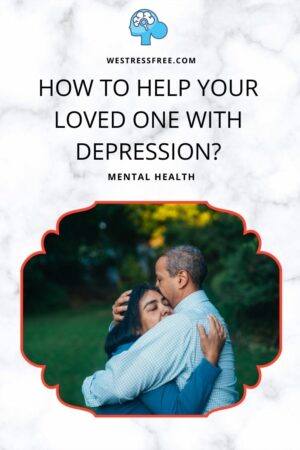

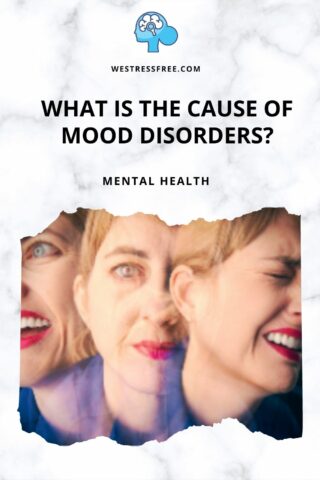






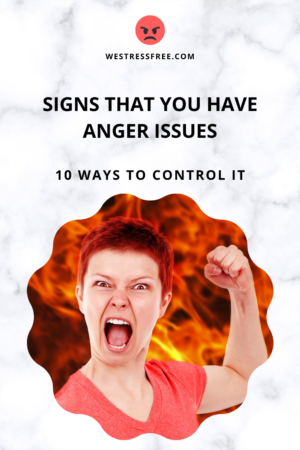







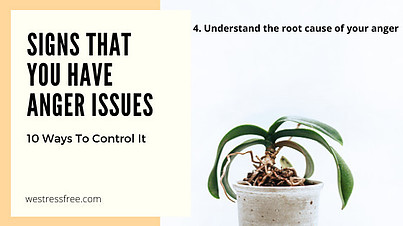
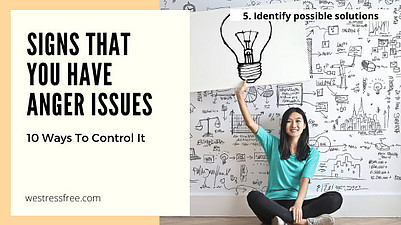

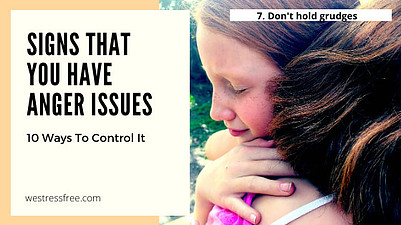

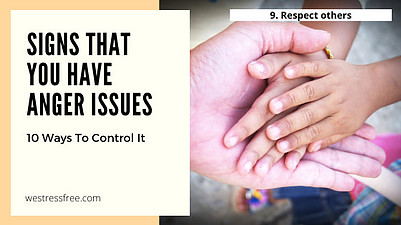
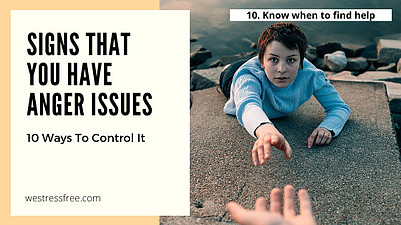
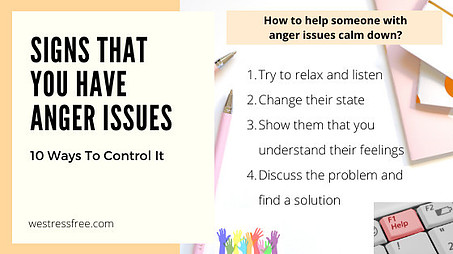



Hi Ferra,
I really enjoyed this post. I like how you explained the different types of anger and what we can do improve and have better outcomes next time.
Best regards,
Sonia
Hi Sonia,
Thank you for your kind comment. Glad you enjoyed this post and found it useful.
Stay safe, happy, and healthy!
Ferra
Hi thanks for this informative post especially during this period that millions of people are bundled up with excessive stress due to the pandemic crisis. You gave various helpful solutions to anger and I agreed that people should know when to seek help and also very important to know when their stress level is gradually creeping up above what they can control and utilize the various relaxation tips you mentioned before things get out of hands. Because we can’t take back the negative comments we already made.
Great post and I think the world need to read this.
Hi Benson,
Thank you for your kind and thoughtful comment. Glad you enjoyed this post and found it useful.
Stay safe, happy, and healthy!
Ferra
Your post really explained anger issues thoroughly. I love how you stated that its not a bad emotion. You just have to know how to handle it. And you gave great ideas for others to help those with anger issues. Would this help with children with anger issues too? Thanks!
Hi Dana,
Thank you for your kind comment. Glad you enjoyed this post and found it useful.
Yes, it would help with children too, however, with children, especially younger ones, they don’t really know how to express their emotions and deal with it, so as parents or adults around them, we need to be involved to help them deal with their anger.
Stay safe, happy, and healthy!
Ferra
Hello, Thank you for the post. Because I found out, that sometimes I have anger issues as well, especially when watching news for my place where I’m from, people are really insane. I don’t know how to express myself, and until I saw this post. But the good thing is, I don’t react in physical.
Good Day,
Ling
Hi Ling,
Thank you for your kind comment. Glad you enjoyed this post and found it useful.
That’s great that you can deal with your anger without hurting yourself or others in the process.
Stay safe, happy, and healthy!
Ferra
Hi Ferra,
I used to be one of the guys who cannot control his anger, so I broke many relationships in the past. But, once I started working out at gyms, this situation changed a lot. By working out, it seems like I release all the bad emotions from me(anger included) That’s why I see myself while I read your article.
Another key point to calm down who have anger issues is indeed a better communication. I didn’t feel understood when I turned to rage in the past. So, if there was someone who follows your instructions to calm me down, I would become soft and apologize for my bad behaviors. I am glad that I read this article now, so I know what methods I can do to calm myself or calm others down.
Thanks for sharing,
Matt
Hi Matt,
Thank you for your kind comment. Glad you enjoyed this post and found it useful.
I agree with you. Sometimes, we just need to be heard. However, our loved ones who are not too sensitive to our feelings won’t know it if we don’t start to communicate with them first.
Taking a deep breath is just a start. But yeah, if someone talks to me and helps me to calm me down, my rage won’t burst out and scare them.
Stay safe, happy, and healthy!
Ferra
Underlying issues can be really dangerous and surface as anger. I am still learning on the techniques to control and channel anger appropriately. Thank you for writing about this important subject. Walking away is what I find really helpful when I am angry. Great article.
Hi Angee,
Thank you for your kind comment. Glad you enjoyed this post and found it useful.
Nice. I do walk away too sometimes but it would just keep the emotions bottled up then it might explode later. So, it is okay to walk away for a bit to calm yourself down and then deal with it.
Find the source of anger then take care of the problem.
Stay safe, happy, and healthy!
Ferra
Thanks for the ideas you shared in your article about anger issues. I have found that when I am going through times that I find difficult, angry or depressed it is hard to be really aware of what is happening. At least at the time. I have learned as time has passed to give myself a bit of time to process events, hold my tongue, and think more before speaking. Make sure what I am reacting to.
While I am far from perfect in this anger area, I am better. Do you find that sometimes you have to reread or rethink issues to get to a more tranquil place? Learning better ways to deal with anger and how to express your feelings go a long way to promoting harmony in your relationships. For me, I just had to learn to give myself some time.
Hi Sami,
Thank you for stopping by my website, reading the post, and leaving a kind comment.
You gave me a great question. Yes, I do find it a good idea to a kind of assess our own feelings, rethink what causes the issues and how I can make myself feel better so my anger won’t affect the loved ones around me.
I appreciate you for sharing your thoughts and support.
Stay safe, happy, and healthy!
Ferra
Hi Ferra
Thanks for sharing a well written article that will help many to know more about those signs that you have anger issues.
Today I’m old enough to be a mother of 3 young adult boys and 2 grandchildren, all of them doing good, and me too.
But my life was not good a few years ago, I was in a family who someone had some anger issues and he didn’t know anything about that, I was lucky to find a good friend who taught me about what are the real emotions and how to manage them in life, he became a good friend and a teacher, he told me also to teach my children what I’ve learned.
When someone (me) learns about emotions and how to express them, life can change for good, I told my children that feeling anger was ok, but not the way many express it, and never to hurt anyone, we learned how to express it and how to solve the problems out. Our lives changed for good, today we can talk about everything and we have a good relationship where all emotions are allowed,
Might seems like a story that you only can find in books, but I know your article will help many and I see the need for many to learn about this to feel and be better in life.
I bookmarked your website as I love to read about this topic and I’m still learning
Hi Alejandra,
Thank you for stopping by my website, reading the post, and leaving a kind comment.
I appreciate you for sharing your thoughts and support. I believe we all can learn from your story. Learning about our emotions and how to express them in a good way is helpful.
You are welcome to come to visit my website again. 🙂
Stay safe, happy, and healthy!
Ferra
Hi! Excellent article, thank you. Of course, I personally believe the first step to helping to control anger issues is to recognize that you HAVE an issue. The next step is to realize it’s something to deal with, not something to blame your actions on. Some people like to blame things ON those anger issues, as if they have no control over their actions or something, instead of seeking help. Some people don’t even think they have problems.
A friend of mine has serious issues, though she’s not violent or anything, the poor fast food people get yelled at a lot because SHE makes a confusing order. Even I was confused the one time I was with her and I knew what she was trying to order. But she has no idea it’s HER, not them. They weren’t screwing up anything, she just was making three different orders, but not doing them IN order, so she’d add something to the first order, while on the third one. Like people are supposed to know? So to her, they’re ‘dumb’ and deserve it? Not that she has no patience and expects people to read her mind. To her, she IS patient. It’s weird. This makes me avoid going anywhere with her because seriously, you have to communicate clearly for one thing, and for another thing, misunderstandings are nothing to get all upset about.
But how to let someone know they’re the problem, not everyone else, without causing them to get angry? Now that’s an interesting dilemma.
Hi Selenity,
Thank you for stopping by my website, reading the post, and leaving a kind comment.
That’s unfortunate that your friend treated the fast-food people that way. I think, one way to do it is by asking her what would she do if she is in the fast-food people’s shoes when she receives a confusing order and being yelled at. Wait until she calms down and then you ask her. She might have felt different.
I appreciate you for sharing your thoughts and support.
Stay safe, happy, and healthy!
Ferra
Anger is a legitimate feeling and I think that letting people know that is a big help toward giving them some very solid advice on how to control and manage these feelings that creep up on us and finally erupt with a variety ways. I’ve had personal experience with anger and I’ve handled it in a variety of ways.
How we manage anger may depend on how we were raised.My mother taught me to control my anger by not showing it .
As a consequence, when I grew up and left home to create my own life-I gave in to extreme anger and often threw things, broke things, banged on the wall, sometimes hurt myself and then had extreme remorse over my actions. I seldom exhibited these things in public, so I guess my early training was not so bad. Unfortunately, my poor husband spent some time repairing the things I broke.
You have given your readers a very complete analysis about anger, the different kinds of anger, how to control it, how it affects our physical health, and what to do about it. There is a lot of anger in our daily life, and it is important that we learn how to approach it.
By the way, I like the crawl notes across the top of your page. A neat idea to an important catch your readers attention.
Hi Barbara,
Thank you for stopping by my website, reading the post, and leaving a kind comment.
You share an interesting thought. I think you have a great point there. The way we were raised can affect the way we act, decide on things, treat people, etc.
I appreciate you for sharing your thoughts and support.
Stay safe, happy, and healthy!
Ferra